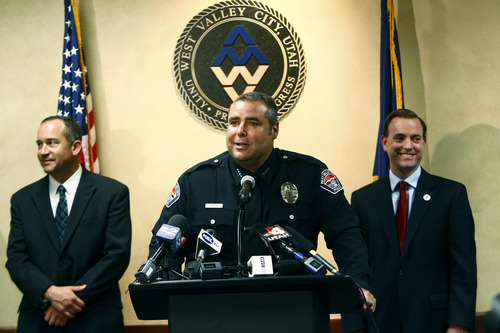This is an archived article that was published on sltrib.com in 2013, and information in the article may be outdated. It is provided only for personal research purposes and may not be reprinted.
While we try to figure out whether to praise his guts or question his judgment, everyone should wish West Valley City's new police chief the best of luck in his new post.
He's going to need it.
Lee Russo, who came up through the ranks of the Baltimore County Police Department and recently served as chief of police in Covington, Ky., has been chosen by City Manager Wayne Pyle as the new boss of the much-troubled police department in Utah's second-largest city.
That appointment, which is subject to City Council approval, will fill the spot vacated by the retirement in March of Chief Thayle "Buzz" Nielsen. Nielsen cited health reasons as the motive for his retirement, which might be another way of saying that he was sick of trying to ride herd on a department that included what now seems to have been a rogue narcotics unit. That squad was involved in one controversial killing, later ruled unjustified by the district attorney, and so many botched searches and arrests that state and federal prosecutors have been moved to drop 125 drug cases brought by the now-disbanded unit.
The disarray in the department, and the vacancy at the top, was the right moment for West Valley City's manager, mayor and council to give serious thought to getting out of the policing business and joining up with the Salt Lake County Unified Police Department. That agency, run by Sheriff Jim Winder, not only has a much cleaner reputation, it would also offer West Valley City taxpayers an economy of scale that could at once reassure local residents as it took some small portion of the burden off of city taxpayers.
Sadly, West Valley officials gave that option short shrift and plowed ahead with the search for a new chief.
The good news is that officials cast a wide net in their search, seeking candidates with strong communication skills and the ability to set a high ethical standard.
Other steps taken by city officials should help the police department perform better under the new chief than it was able to under the old one. Those steps include agreements with local Latino groups for more cultural training for officers, as well as strengthening, and making more transparent, the city's Professional Standard Review Board. A similar review board in Salt Lake City, as recently reported, has done much to reduce complaints against, and increase public trust in, that city's constabulary.
A police department that does not enjoy the trust of its community is no better than an occupying force. Building that trust is what Chief Russo must now set about doing.



